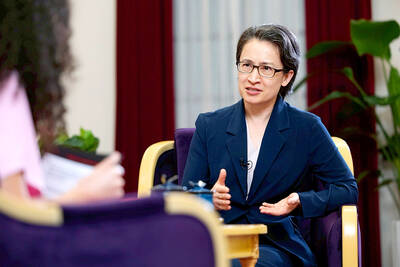Poorly designed subsidies discourage disabled people from living independently, violating international law, members of the Taiwan Community Living Consortium said yesterday.
They made their remarks during a hearing at the Legislative Yuan in Taipei organized by Democratic Progressive Party Legislator Chen Chieh-ju (陳節如).
“There are very few community living programs, because funding is extremely inadequate and there currently is no policy supporting their continuous operation,” Taiwan Community Living Consortium president Chen Mei-ling (陳美鈴) said. “At a time when the government cannot make a firm policy promise, nonprofits are afraid to operate the programs and parents are afraid to entrust their children to us.”
She said that the programs allow disabled individuals to lead richer and more normal lives compared with institutional care by allowing them greater freedom, adding that the programs also cost less, because they do not require permanent facilities to be purchased and maintained.
The consortium’s members condemned the current subsidy scheme for mainly funding institutional living.
“Currently, no institution will turn [a disabled person] away — everyone is accepted, because there are subsidies — but that money is not available to those who want to live in a community living program,” National Yang-Ming University professor of health and welfare Chou Yueh-ching (周月清) said.
She said that only 0.03 percent of disabled people in the nation live in community living programs, compared with 6.8 percent who live in institutions, adding that the remainder live independently or with their family.
The advocates emphasized that choosing where and how one lives is a right for the disabled under the UN’s Convention on the Rights of Persons with Disabilities, which Taiwan has ratified.
“Community inclusion is a human right and institutional living must stop,” Harvard Law School Project on Disability senior researcher Janet Lord said.
“There is a very clear evidence base that institutions are diminishing of human rights, that they create cycles of dependence; they are isolating, oppressive and they create conditions in which human rights violations flourish,” Lord said, adding that the institutions increase the likelihood of violence, sexual abuse and exploitation, while reducing the opportunity for a quality education and meaningful activities.
Chiang Hsiu-chu (蔣秀珠), a resident of a community living program in Taichung administrated by the Maria Social Welfare Foundation, said she liked the arrangement better than institutional living, because she can decide when to sleep, can go to work by herself and is also able to go to a nearby park to exercise.
Social and Family Affairs Administration Deputy Director-General Chu Chien-fang (祝建芳) said that the government supports making it easier for disabled people to choose community living because of the increase in the quality of life allowed.
While in the past subsidies were capped because there were only trial programs, there is now a legal foundation to allow for caps to be lifted and subsidies distributed in the same manner as assisted-living institutions, Chu said.
She added that the main roadblock to expansion has been the failure by local governments to draft relevant fee schedules, preventing subsidies from automatically being distributed to community living programs.

Temperatures in northern Taiwan are forecast to reach as high as 30°C today, as an ongoing northeasterly seasonal wind system weakens, the Central Weather Administration (CWA) said. CWA forecaster Tseng Chao-cheng (曾昭誠) said yesterday that with the seasonal wind system weakening, warmer easterly winds would boost the temperature today. Daytime temperatures in northern Taiwan and Yilan County are expected to range from 28°C to 30°C today, up about 3°C from yesterday, Tseng said. According to the CWA, temperature highs in central and southern Taiwan could stay stable. However, the weather is expected to turn cooler starting tonight as the northeasterly wind system strengthens again

The Ministry of Foreign Affairs (MOFA) yesterday expressed “grave concerns” after Singaporean Prime Minister Lawrence Wong (黃循財) reiterated the city-state’s opposition to “Taiwanese independence” during a meeting with Chinese Premier Li Qiang (李強). In Singapore on Saturday, Wong and Li discussed cross-strait developments, the Singaporean Ministry of Foreign Affairs said in a statement. “Prime Minister Wong reiterated that Singapore has a clear and consistent ‘one China’ policy and is opposed to Taiwan independence,” it said. MOFA responded that it is an objective fact and a common understanding shared by many that the Republic of China (ROC) is an independent, sovereign nation, with world-leading

COOLING OFF: Temperatures are expected to fall to lows of about 20°C on Sunday and possibly 18°C to 19°C next week, following a wave of northeasterly winds on Friday The Central Weather Administration (CWA) on Sunday forecast more rain and cooler temperatures for northern Taiwan this week, with the mercury dropping to lows of 18°C, as another wave of northeasterly winds sweeps across the country. The current northeasterly winds would continue to affect Taiwan through today, with precipitation peaking today, bringing increased rainfall to windward areas, CWA forecaster Liu Pei-teng (劉沛滕) said. The weather system would weaken slightly tomorrow before another, stronger wave arrives on Friday, lasting into next week, Liu said. From yesterday to today, northern Taiwan can expect cool, wet weather, with lows of 22°C to 23°C in most areas,

DEFENDING FREEDOM: Taiwanese love peace and helping others, and hope to be a positive force in the world, Vice President Hsiao Bi-khim told ‘Weltspiegel’ Taiwan is making every effort to prevent war in the face of China’s hybrid coercion tactics and military threats, Vice President Hsiao Bi-khim (蕭美琴) said in an interview with German public broadcaster ARD’s program Weltspiegel that aired on Monday. Taiwan is not seeking provocation or intending to disrupt international order, but “must possess the capacity for self-defense,” a news release issued by the Presidential Office yesterday quoted her as saying. Taiwan is closely watching not only the increasing scope and frequency of Chinese military exercises around the nation, but also Beijing’s hybrid and cognitive warfare tactics, including manipulating public opinion, fostering